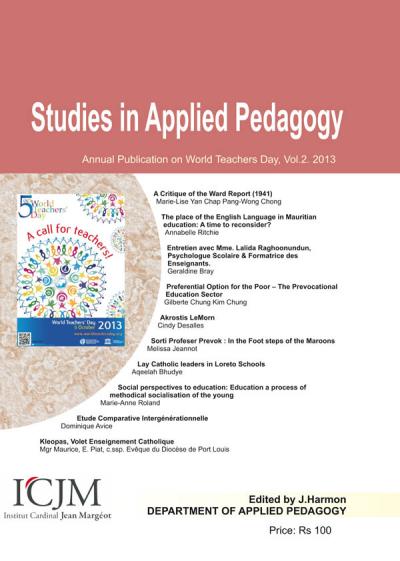We are pleased to present the second volume of Studies in Applied Pedagogy. Following feedback we got last year for Volume 1 and taking into considerations the exigencies and constraint of any publication project, we have decided to have an annual publication which will come out on UNESCO World Teachers’ Day. The theme for Year 2013 is very telling: ‘The Call For Teachers’. In an ‘Open Letter to Educators’ (27 May 2013) the following:
As educators, we have a particular responsibility to ensure that students in their care receive the type of education and learning experiences that help transform their lives so that they can break the bonds imposed by forces for intense individualism. We must help our youth to better contribute, as responsible citizens, to the common good. Educators need to be socially as well as educationally responsible, in order to create the conditions within their schools that challenge students to see the bigger picture and to want to make a difference in their own lives and in the larger community. It is there that educational leaders have also a public role to play as transformatory intellectuals.
The Open Letter is published in this volume as a retrospective of the major issue which dominated the education sector in 2013. In fact, it is in this role and mission as transformatory intellectuals that we will continue to encourage and support academic and non-academic trilingual papers (Mauritian Kreol, English and French), making this publication become gradually a forum for academics and practitioners to inform national policies for social transformation.
In this Volume, we are pleased to present two papers on the history of education in Mauritius. History of education in Mauritius is an unexplored research area while we realize how important it is for us to understand the socio-political evolution of our education system. The first paper is from M. Yan who makes a critique of the Ward Report in the days of British colonization. The author gives the content of the report, looks at the person of Ward, how he impacted colonial education in Africa and she makes a critical analysis of the comments in the newspapers at that time. The second paper is by A. Bhudye on the Loreto Schools which were the first to establish in Mauritius dating as far back as 1845. She presents the findings of a study on the transition from religious to lay principalship in Loreto secondary schools by the end of the 1980s. The author provides enriching insights into the lives of the Lay Catholics having held positions of leadership at that particular period.
Another interesting theme is the medium of instruction. A. Ritchie, Mauritian born and foreign language teacher in Australia, addresses the teaching of English language in our schools. She invites us to reconsider the place of English in our education system not so much to replace it by another medium of instruction but rather to develop a better awareness of how to teach English as a Second Language (ESL). She looks at the curriculum, English content based teaching, and training. In a similar vein, G. Chung, Director of Catholic education, writes a shortened version of a Paper presented at the 6th International Conference on Catholic Educational Leadership of the Australian Catholic University held in Sydney from 12th to 14th August 2013. This is a study on how the Diocese of Port-Louis has for the past decades pioneered several projects in education and has implemented internal policy decisions in line with the preferential option for the poor. Some of these initiatives have led to national policy decisions in areas such as the inclusion of the mother-tongue and the inclusion of youths which the education system has failed. Another interesting study is the one presented by D. Avice on a comparative study of two different generations of teachers. Her findings will help us to better understand how to adjust our teacher training and how to enrich the vocation of a new generation of teachers. In this same volume, we are also very much pleased to have an interview of N. Raghoonundun, psychologist and Associate Professor at the Mauritius Institute of Education. The interview has been conducted by G. Bray who is a psychologist and who contributed a paper to our first volume. N. Raghoonundun gives us her views on how teachers and parents can play a key role in the teaching and learning process and she also gives her views about schooling as an instrument of nation building.
Two additional non-academic papers enrich this volume. A blog by M.A. Roland, primary Deputy Head Teacher, and who is currently completing her Master in Educational Leadership with the Australian Catholic University. She invites us to go through a rapid overview of identity and socialisation in our schools. This is a very important theme which we hope to have the opportunity to address more deeply in future volumes. This volume also pays a special tribute to the legacy of maroons. C. Desalles makes an inspiring acrostic with LeMorn and M. Jeannot comes back on the outing of Prevocational teachers ‘in the footsteps of the maroons’ at the foot of Le Morne Mountain, UNESCO World Heritage, during 2012 Easter vacation. Both papers are in Mauritian Kreol.
Finally, we have published a Letter of Bishop Piat addressed to educators in catholic schools. The letter is about the educational dimension of the Kleopas project. This project of the Catholic Church in Mauritius, launched on 8th September 2013, aims at revisiting the Church’s mission in the transmission of faith at parish level, family and school. This project comprises consultations, studies and publications scheduled for 2013-2015.
The second volume of “Studies in Applied Pedagogy”
- Publicité -
EN CONTINU ↻



